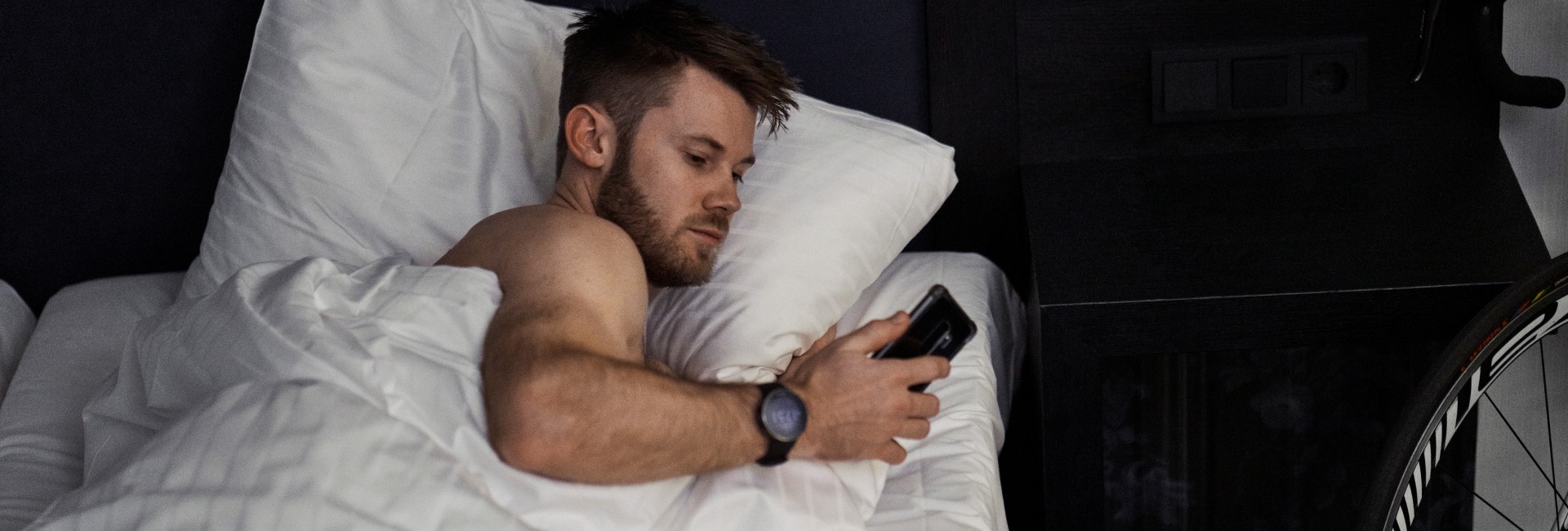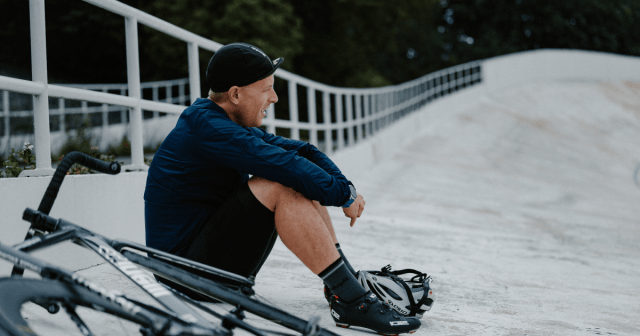We usually think of sleep as one uniform experience when we lay down to rest each night. A singular process that we (ideally) emerge from refreshed, recovered, and ready to tackle what the new day may bring us. The reality is that our mind and body experience different sleep stages throughout the night, each with distinct characteristics and benefits. This means that we are never simply at rest – and why every night’s sleep is different.
Different sleep stages
Our sleep stages form the basic structure of how a typical night of rest and recovery occurs. According to the American Academy of Sleep Medicine, there are four stages of sleep in a cycle, which are formed by two different types of sleep: non-rapid eye movement (NREM) sleep and rapid-eye-movement (REM) sleep. However, before we reach these periods of sleep there is Stage W, which is simply when we are awake. In order to journey into sleep, we start out in this stage in a non-resting state.
Stages N1-3 are NREM sleep, which is when our body slows down. All activity associated with our brain waves, heartbeat, breathing, and muscles reduce to lower levels than when awake as our body uses this time to repair and enhance our various systems. It’s also the type of sleep that is rarely associated with a dream state (although it is still possible to experience vivid dreams, just less likely).
The NREM stages include:
- N1: the lightest stage of sleep. Our entry point, where we begin the transition into a deeper sleep but are still easily woken by noises around us.
- N2: a deeper stage of sleep, where our heart rate and body temperature drop, but loud noises can still wake us. This stage is characterized by sleep spindles: rapid bursts of high-frequency brain waves that are thought to be important for learning and memory.
- N3: often referred to as deep sleep or slow-wave sleep. It is very difficult for us to wake up during stage 3. During this stage, the body repairs and regrows tissues, builds bone and muscle and strengthens the immune system.
Stage R is REM sleep which, as the name suggests, is when our body experiences bursts of rapid eye movement and brain activity, in a surprisingly similar way to how our body behaves when we are awake. It is the type of sleep associated with vivid dreaming and a kind of sleep paralysis when our muscles lose their ability to move to stop us from acting out our dreams (so this is not the stage when people sleepwalk, for example). REM sleep is vital for our memory and emotional regulation, as our brain is processing and clearing what we no longer need.
How long is a sleep cycle?
All the above sleep stages combine to form a whole sleep cycle, generally lasting around 90 to 110 minutes. So, if you sleep for eight hours a night, your body will complete multiple sleep cycles, repeating until you wake.
Throughout the night, each sleep cycle is different, with most deep sleep occurring in the first half of the night and most REM sleep occurring in the last half (if enough sleep occurs). So, by the time you reach the early hours of the morning, you will mainly be alternating between the N2 and R stages of sleep.
How long is each sleep stage?
During each sleep cycle, the body experiences each sleep stage for differing lengths, depending on how long you have been at rest. Here is how long each sleep stage is for adults:
- N1: 1 to 7 minutes in our initial sleep cycle, constituting 5-10% of our overall night of sleep.
- N2: 10 to 25 minutes in the initial sleep cycle and lengthens with each successive cycle, eventually constituting between 45-55% of our overall night of sleep.
- N3: 20 to 40 minutes in our initial sleep cycle and makes up about 15-25% of our overall night of sleep.
- R: only 1 to 5 minutes in the initial sleep cycle but lengthens with each successive cycle.
How much REM sleep should I get each night?
As mentioned, REM sleep starts out in short periods and then becomes progressively longer. We usually have our longest stretch of REM sleep in the morning, just before waking. This is why you’ll often remember your dreams more clearly if you have had a long, uninterrupted night of sleep.
As we have multiple intervals throughout the night, each with varying lengths, it isn’t easy to quantify precisely how much REM sleep we require. However, if we don’t get a whole night’s sleep, then we are more likely to miss out on the sleep cycles with longer REM stages. So, as an adult, it’s essential to get at least seven to nine hours of sleep each night to enhance our REM time.
Deep sleep vs light sleep
When we talk about light and deep sleep, we mean NREM sleep stages. Light sleep happens during stages 1 and 2, and deep sleep happens during stage 3.
As we’ve seen above, all the stages of sleep are essential as they work together in a cycle, enabling our body to rest and recover during the night fully. So, it’s crucial to get a whole night’s sleep to ensure we are well-rested and have benefited from the different stages.
Often when our sleep is disrupted, we lose out on deep sleep. This means we miss out on the time that our body needs each night to reap the benefits of the N3 sleep stage, such as enhancing your memory and learning functions, supporting cell growth, and boosting your immune system.
If you are interested in ensuring you have sufficient deep sleep each night, you should review your sleeping conditions to create the ideal environment for a whole night of rest. Some studies have also indicated that exercising 90 minutes before bedtime can increase the amount of deep sleep you have (but may reduce the amount of REM sleep).
While deep sleep is vital, light sleep has its benefits as well. For example, when we wake naturally during this part of our sleep cycle, we are more likely to feel rested, refreshed, and ready to start the day – quite a different morning experience to when your alarm goes off while you are in a deep sleep stage.
Sleep changes as you age
If you used to sleep till noon as a teen but find yourself waking at dawn as an adult, you’ve probably noticed how the way you sleep has evolved across your life. Here is how our need for and experience of sleep changes as we age.
- Newborns and infants: initially, babies need 14 to 17 hours of sleep, usually in sections throughout the day. By their first birthday, they typically sleep 11 to 14 hours per day, mainly at night, with a few naps during the day. Interestingly, newborns have a completely different sleep architecture, initially entering their sleep cycle through REM. It also takes three months for their bodies to understand circadian rhythms.
- Young children: while the need for sleep (including naps) decreases, children around the age of five still need around 12 hours per night. It is also from this age that REM sleep gradually becomes more prolonged, increasing slowly until the age of nineteen. As children age through their pre-teen years, the need for sleep reduces to around 9-11 hours each night.
- Teenagers: teens require around 8-10 hours of sleep each night and, during different stages of puberty, may experience afternoon sleepiness.
- Adults: sleep cycles remain relatively stable throughout adulthood until around the age of 65, with the average adult needing 7-9 hours of sleep each night.
- People over 65: after this age, people get slightly less slow-wave deep sleep and spend more of their sleep cycle in stage 2. This means that older people don’t sleep as soundly as when they were younger, and often require slightly less sleep (around 7-8 hours).
Tracking your sleep stages
One way to understand your sleep cycles is to track them. Polar’s Nightly Recharge™ provides you with a detailed analysis of your rest each morning when you wake, so you can understand the quantity and the quality of sleep you have experienced overnight.
Nightly Recharge™ has two separate metrics: Sleep Charge and ANS Charge. Sleep Charge is the area related to your sleep stages. Your Sleep Score shows the length of time you slept, the continuity of this sleep, the length of any interruptions, and details what percentage of your rest was spent in REM, deep and light sleep. Then Sleep Charge compares your Sleep Score to your 28-day average to show how your recovery matches up.
ANS Charge means your heart rate, heart rate variability, and breathing while you slept to understand how well your autonomic nervous system relaxed during the first four hours of sleep each night. Nightly Recharge™ then uses these two metrics to rate your overall recovery (i.e., Good or Compromised), so you can decide how active to be during the day.
Resources
Minkoff, Krystle. A2Zzz 25.4. 2016. Sleep: The Evolution of Sleep Medicine in Neurology (Part One).
Hirshkowitz, Max; Whiton, Kaitlyn; et al. 2015. Sleep Health: Journal of the National Sleep Foundation. Elsevier Inc. 1: 40–43. National Sleep Foundation’s sleep time duration recommendations: methodology and results summary.
Colten HR, Altevogt BM. Institute of Medicine (US) Committee on Sleep Medicine and Research. 2006. Ch 2 – Sleep Physiology. Sleep Disorders and Sleep Deprivation: An Unmet Public Health Problem.
If you liked this post, don’t forget to share so that others can find it, too.
Please note that the information provided in the Polar Blog articles cannot replace individual advice from health professionals. Please consult your physician before starting a new fitness program.


